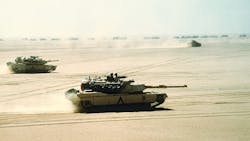Opinion: artificial intelligence (AI) may fall short when applied to maneuver warfare and military operations
WASHINGTON – Artificial intelligence (AI) has the potential to revolutionize warfighting concepts based on maneuver, but there are several technical and operational hurdles to overcome first. The International Institute for Strategic Studies (IISS) reports. Continue reading original article
The Military & Aerospace Electronics take:
18 May 2020 -- Modern maneuver warfare will depend on making faster and better decisions than one’s adversary, which in turn will depend on information superiority and dominance in cyberspace. However, there are obstacles to overcome for it to become a reality, at least in the near term.
AI may increase the speed of military operations, but it could also lead to less decisive outcomes. And rather than leading to a new form of maneuver warfare, it may elicit a more technologically sophisticated version of attrition warfare.
Consequently, military planners who envision a 21st century multi-domain maneuver warfare version of the 1991 Gulf War campaign, underpinned by AI-enabled capabilities, could be disappointed.
Related: Artificial intelligence and embedded computing for unmanned vehicles
Related: Electronic warfare technology heading-up the battlefield
John Keller, chief editor
Military & Aerospace Electronics
